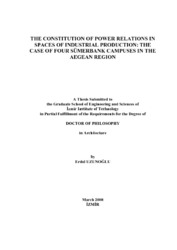Please use this identifier to cite or link to this item:
https://hdl.handle.net/11147/2984Full metadata record
| DC Field | Value | Language |
|---|---|---|
| dc.contributor.advisor | Doğan, Fehmi | - |
| dc.contributor.author | Uzunoğlu, Erdal | - |
| dc.date.accessioned | 2014-07-22T13:48:42Z | - |
| dc.date.available | 2014-07-22T13:48:42Z | - |
| dc.date.issued | 2008 | en |
| dc.identifier.uri | http://hdl.handle.net/11147/2984 | - |
| dc.description | Thesis (Doctoral)--İzmir Institute of Technology, Architecture, İzmir, 2008 | en |
| dc.description | Includes bibliographical references (leaves: 216-221) | en |
| dc.description | Text in English; Abstract: Turkish and English | en |
| dc.description | xv, 417 leaves | en |
| dc.description.abstract | Places of industrial production, emerged in the 18th century, were originally places where different manufacturers would use the same space together. These early factories provided the tools and machinery needed, but each manufacturer would conduct its own production separately. This mode of production went through transformations to increase productivity and efficiency for high profit. Correspondingly, the demand for efficiency resulted in strict surveillance of workers and production. The realization that space has potentials in administering .efficiency. and .surveillance. led to a transformation in the morphology of industrial space. In the same process, technological inventions, new ideas on production methods and construction technologies all had undeniable effects. However, industrial sites were ultimately transformed into places where the ruling power would directly control the labor force.This study focuses on power relations played out in industrial space through a study of four Sümerbank factories namely Nazilli, İzmir, Bergama and Manisa. A comprehensive research is conducted on the instrumentalization of industrial space in the administration of power relations and on the development of industrial space. Data related to cases of the study were collected through field trips, archival research and interviews with some ex-employees of the factories. These factories are analyzed in terms of .efficiency., .discipline. and .surveillance. which are influential in the formation and transformation of the industrial space. It is concluded that these factories were mainly shaped according to efficiency and productivity as it was in the rest of the world rather than according to ideals of modernization solely and that they were places where new socioeconomic classes were formed regardless of the state ideology which preached a class-free society.Key words/phrases: power relations, industrial workspace, architecture of industrial structures, efficiency, inspection, discipline, panopticon, Turkish industrialization, Sümerbank factories. | en |
| dc.language.iso | en | en_US |
| dc.publisher | Izmir Institute of Technology | en_US |
| dc.rights | info:eu-repo/semantics/openAccess | en_US |
| dc.subject.lcc | NA6403.T9 U99 2008 | en |
| dc.subject.lcsh | Architecture, Industrial--Turkey | en |
| dc.subject.lcsh | Turkey--Politics and goverment | en |
| dc.subject.lcsh | Industrializatim--Turkey | en |
| dc.title | The constitution of power relations in spacesof industrial production: The case of four Sümerbank Campuses in the Aegean Region | en_US |
| dc.type | Doctoral Thesis | en_US |
| dc.institutionauthor | Uzunoğlu, Erdal | - |
| dc.department | Thesis (Doctoral)--İzmir Institute of Technology, Architecture | en_US |
| dc.relation.publicationcategory | Tez | en_US |
| item.languageiso639-1 | en | - |
| item.fulltext | With Fulltext | - |
| item.openairecristype | http://purl.org/coar/resource_type/c_18cf | - |
| item.openairetype | Doctoral Thesis | - |
| item.grantfulltext | open | - |
| item.cerifentitytype | Publications | - |
| Appears in Collections: | Phd Degree / Doktora | |
Files in This Item:
| File | Description | Size | Format | |
|---|---|---|---|---|
| T000700.pdf | DoctoralThesis | 9.93 MB | Adobe PDF |  View/Open |
CORE Recommender
Page view(s)
118
checked on Jul 22, 2024
Download(s)
496
checked on Jul 22, 2024
Google ScholarTM
Check
Items in GCRIS Repository are protected by copyright, with all rights reserved, unless otherwise indicated.